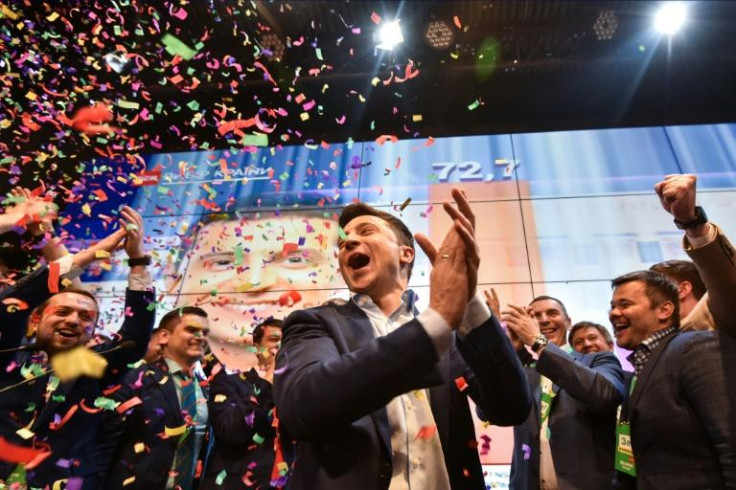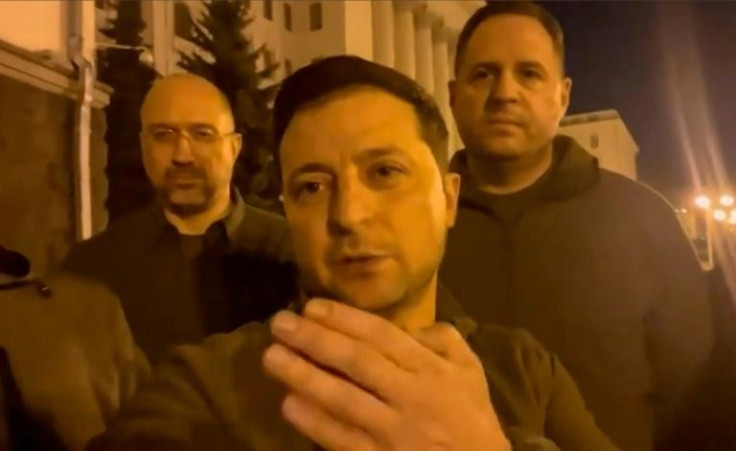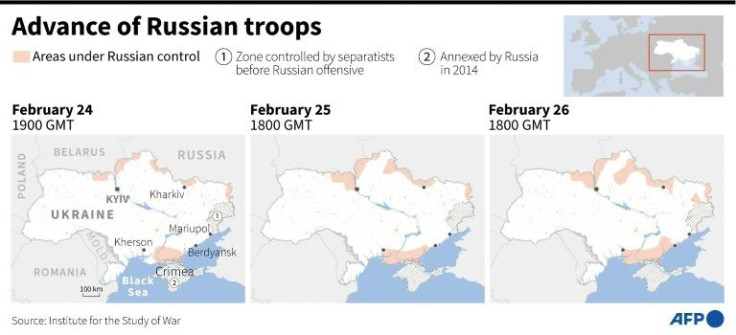Ukraine's actor-president grows on stage as war-time leader
Zelensky has shot to fame abroad, while coming under increasingly vicious attacks from the Kremlin.
Volodymyr Zelensky was at the height of his career as an actor and comedian before giving it all up to become president in 2019. After three difficult years in politics, he is now the face of national defiance, winning rave reviews as a war-time leader.
Since Russia's invasion last Thursday, the 44-year-old has used his eye for modern image management and the skills honed on stage to deliver stirring messages on social media.
On February 25, the day after the outbreak of war, he filmed himself standing in the dark near the presidency building with his advisors, saying "we are all here" in an attempt to counter disinformation that he had abandoned his post.
"Our military is here. Citizens in society are here. We're all here defending our independence, our country, and it will stay this way," he said.

Looking sleep-deprived but occasionally smiling, he appeared without a bullet-proof vest or helmet despite repeated warnings that Russia intended to assassinate him.
The day after, this time in daylight, he posted another self-filmed video in front of the presidency wearing what has become his crisis uniform: a military-style khaki t-shirt, coupled with a soft green jacket.
These messages as well as more formal daily announcements have sought to find a balance between lifting spirits, warning about the gravest danger to the country since 1941, while talking up the "indomitable" character of Ukrainians.
In a call with US President Joe Biden, who offered him help if he needed to leave, the former stand-up artist reportedly delivered a pithy one-liner that has further embellished his reputation.
"I need ammunition, not a ride," Zelensky said, according to a tweet from the Ukrainian embassy in Britain.

And while speaking with EU leaders by video-call, he sought to marshal the emotional pull of his seemingly tragic position under siege.
"This might be the last time you see me alive," the father-of-two said before appealing for military aid, the Axios news website reported.

As well as becoming a focal point for Ukrainians as they seek to resist Russian occupation, Zelensky has shot to fame abroad, while coming under increasingly vicious attacks from the Kremlin.
On Friday, Russian leader Vladimir Putin said Zelensky, who is Ukraine's first Jewish president, headed a government that was "a gang of drug addicts and neo-Nazis."
Andrew Roberts, a historian and visiting professor at the Department of War Studies at King's College London, compared Zelensky to British war-time leader Winston Churchill, who once called courage "the first of human qualities because it is the quality that guarantees all the others."
"He is channelling an authentic inner Churchill," Roberts wrote in an email to AFP.
Roberts, who produced a biography of Churchill in 2018 and is also the author of "Leadership in War: Essential Lessons from Those Who Made History", said there were several similarities.
He pointed to Zelensky's "incredible personal bravery" as well as "his ability to connect directly with his people" and "his uncompromising stance and belief in ultimate victory".
Eliot A. Cohen, a defence expert at the US-based Center for Strategic and International Studies and another author on war-time leadership, said it was a "classic case of 'cometh the hour, cometh the man'."
"In war time, it's a cliche, but you discover all sorts of things about yourself and others," he told AFP. "He's absolutely risen to the moment."
Writing Sunday in France's Journal du Dimanche newspaper, French philosopher Bernard-Henri Levy said Zelensky reminded him of other freedom fighters he had encountered who "learned how to wage war without loving it."
"This man is now Putin's nightmare," he wrote.
Zelensky ran for president seemingly as a joke in 2019, but ended up defeating his arch-rival Petro Poroshenko in a runoff by more than 70 percent of the vote.
He was catapulted to national fame while playing a foul-mouthed school teacher on TV who became president after one of his students filmed his profane rant against corruption and posted it online.
The evening comedy show captured the zeitgeist just as the country was gripped by cataclysmic change following a 2014 pro-EU revolution that ousted a Kremlin-backed leader, followed by war in the east against Russian-backed separatists.
Using the same approach then as now, Zelensky campaigned for president aware of the political power of social media, skipping traditional interviews and rallies in favour of clips posted online that sought to play up his down-to-earth charm.
Poroshenko mocked the Ukrainian-language skills of his opponent, a primarily Russian speaker from the central industrial city of Krivy Rig, and said he lacked the political stature to stand up to Putin.
In his inauguration speech, he vowed that he had "tried to do all I could to make Ukrainians smile" and now wanted to "do all I can so that Ukrainians don't cry".
In the three years since taking power, he struggled to deliver on his main pre-election promises -- namely ending the conflict in the east, and tackling the scourge of corruption.
The coronavirus pandemic and ongoing economic problems had also eroded confidence in his leadership.
But domestic political issues have been put to one side in what is seen by many Ukrainians as a fight for survival.
"People have been talking about how the Russians are masters of information warfare," Cohen added. "They've really had their clocks cleaned by Ukraine and the United States."
© Copyright AFP 2022. All rights reserved.
This article is copyrighted by International Business Times, the business news leader





















